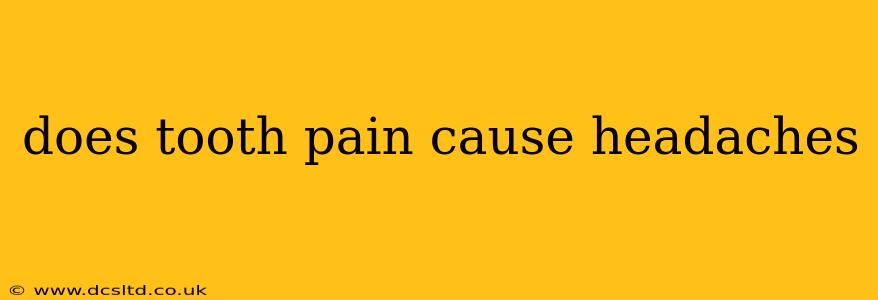Yes, tooth pain can absolutely cause headaches. The connection isn't always direct or immediately obvious, but the intricate network of nerves and tissues in your head and face means that pain originating in your teeth can easily radiate to other areas, including your head, causing headaches. This isn't just a coincidence; it's a physiological phenomenon explained by the close proximity and interconnectedness of various nerve pathways.
How Does Tooth Pain Lead to Headaches?
The primary reason tooth pain can cause headaches is the shared nervous system innervation. The trigeminal nerve, a major cranial nerve, is responsible for sensation in much of your face, including your teeth, gums, and the temporal region of your head (where many headaches originate). When you experience tooth pain, the trigeminal nerve is overstimulated. This overstimulation can trigger pain signals that spread along the nerve's branches, causing pain not only in your teeth but also in your head.
This type of headache is often described as a dull ache or throbbing sensation in the temple or forehead area, often on the same side of the head as the affected tooth. The intensity of the headache can vary greatly depending on the severity of the underlying tooth problem.
What Types of Headaches Can Tooth Pain Cause?
While tooth pain can contribute to various headache types, it's most commonly associated with:
- Tension headaches: These are the most common type of headache, characterized by a mild to moderate tightening or pressure around the head. Tooth pain can exacerbate existing tension headaches or even trigger them.
- Sinus headaches: Although often confused with toothaches, sinus headaches stem from inflammation or infection in the sinuses. However, severe tooth infections can cause inflammation that puts pressure on the sinuses, leading to a sinus-like headache. Differentiating between the two is crucial for proper treatment.
- Migraines: While less directly linked, severe or chronic tooth pain can potentially trigger migraines in susceptible individuals. The intense pain and inflammation associated with dental issues can disrupt the body's delicate balance, potentially leading to a migraine attack.
What Else Can Cause Headaches That Feel Like Toothaches?
It's crucial to note that headaches can mimic toothaches, and vice versa. Other conditions that can cause headaches that might feel like they originate in your teeth include:
- Sinusitis: Inflammation of the sinuses can cause pressure and pain in the face, often mistaken for tooth pain.
- Temporomandibular joint (TMJ) disorders: Problems with the TMJ, the joint connecting your jaw to your skull, can cause pain in the jaw, temples, and even the ears, which might feel like a toothache.
- Cluster headaches: These are severe, debilitating headaches typically affecting one side of the head around the eye. While not directly caused by tooth pain, the intense pain can be mistaken for a severe toothache.
How Can I Tell If My Headache is From a Tooth Problem?
Distinguishing between headaches originating from teeth and other sources can be challenging, often requiring professional evaluation. However, some clues might point towards a dental origin:
- Localized pain: Pain concentrated in a specific tooth or area of the jaw is more suggestive of a dental problem.
- Sensitivity to temperature: Increased sensitivity to hot or cold foods or drinks can indicate a dental issue.
- Pain worsening with chewing or biting: This points towards a problem with your teeth or jaw.
When Should I See a Doctor or Dentist?
If you're experiencing headaches along with tooth pain, it's crucial to seek professional help. A dentist can diagnose and treat underlying dental problems. A doctor or neurologist can rule out other potential causes of headaches. Don't attempt self-diagnosis or treatment, as delaying appropriate care can worsen the condition.
Disclaimer: This information is for educational purposes only and should not be considered medical advice. Always consult with a healthcare professional for any health concerns or before making any decisions related to your health or treatment.
